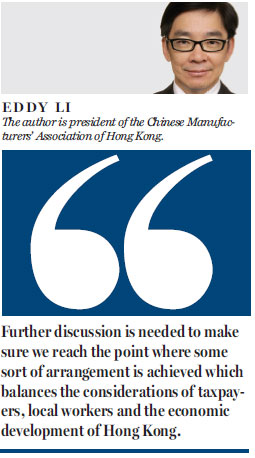Labor importation will benefit HK
Updated: 2016-01-15 08:11
By Eddy Li(HK Edition)
|
|||||||
Eddy Li argues that importing workers can offer Hong Kong considerable benefits and says the city could learn much from the example of Singapore
In the latest 2016 Policy Address, Chief Executive Leung Chun-ying mentioned the controversial labor importation issue. In paragraph 135, he stated that "while we will strive to provide training and attract local workers to join the industry, there is still a genuine need to import workers to cater for our development needs, on the premise of according priority to local workers in employment and safeguarding their wage levels".
Recent years have witnessed many news reports about the postponements or over-expenditure of major engineering projects under construction. Most of these, if not all, result from a severe shortage of skilled workers. They are like gold these days, yet they are so indispensable that employers can either wait for their availability or accept their salary increases - or worse still, endure both. Take reinforcement fixing, for example; the daily wage of a worker has increased from HK$1,490 in 2013 to HK$2,150 in 2016 - up by a substantial 44 percent.
Ongoing projects like the Hong Kong-Zhuhai-Macao Bridge, the third runway of Hong Kong International Airport, the Guangzhou-Shenzhen-Hong Kong Express Rail Link, the Kai Tak Development and Trunk Road T2 cannot come into service if the labor shortage deteriorates or continues. According to a forecast done by the Construction Industry Council, there will be a shortage of about 10,000 to 15,000 skilled workers in the construction industry for the coming few years.
At this point, labor importation is necessary and urgent for the construction industry. In Wednesday's report, the CE said "the government will review the effectiveness of the enhancement measures under the Supplementary Labour Scheme to ensure the sustainable development of the construction industry".
Labor importation has always been a controversial issue because it might affect the employment conditions and wage levels of some local workers, so it is more or less evaded by many governments around the world. I respect the government's ambition to solve the labor shortage problem in the construction industry. I believe the government will impose proper protection for local employees to avoid angering them.
Cases in foreign countries can be referred to when we discuss the issue. In Singapore, the upper ratio limit of local to imported labor in the construction business is as high as one to seven, i.e., there can be seven imported workers for every eight employees in the industry. However, there are some extra tax rules: Employers have to pay extra tax for imported labor; the lower the technology is involved, the higher the tax is; the tax of every migrant worker varies from S$280 ($194) to S$650. What is more, the Singapore government approves working visas depending on an employee's educational background and monthly salary to control the low-tech labor force.
As an Asian economy that is frequently compared with Hong Kong, it is worth making reference to Singapore's experience. But we do not have to copy the Lion City's policy on labor importation exactly. Further discussion is needed to make sure we reach the point where some sort of arrangement is achieved which balances the considerations of taxpayers, local workers and the economic development of Hong Kong.

(HK Edition 01/15/2016 page10)